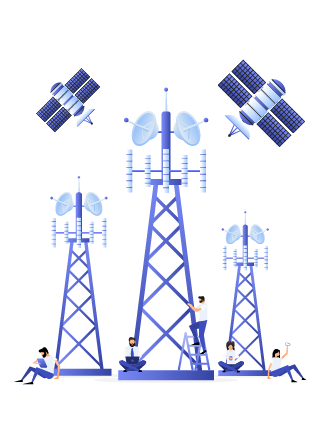Consultation on Enterprise Telephony regulations in India
We, at VINCULAR, provide consultation on Indian telephony guidelines and support enterprises to manage compliance of their corporate telephony deployment requirements.
Regulating Authority-Background
In today’s rapidly changing and demanding telecom landscape, enterprises using voice-based corporate telephony systems, whether on-premises or cloud-based are under increasing pressure to comply with evolving compliance and regulatory requirements. Indian government and telecom regulatory bodies such as the Department of Telecommunications (DoT) and the Telecom Regulatory Authority of India (TRAI) are intensifying their scrutiny, making telecom compliance more challenging than ever before.
To navigate these complexities, enterprises need to enhance their processes, systems, and technology solutions. They require an effective and dynamic guidance partner that can help them to adapt changing government regulations in India.
To navigate these complexities, enterprises need to enhance their processes, systems, and technology solutions. They require an effective and dynamic guidance partner that can help them to adapt changing government regulations in India.

Guidelines for enterprise telephony in India

The introduction of new rules and modifications of existing ones present a range of challenges for enterprises. Over the years, certain telecom regulations in India have existed in a grey and ambiguous space due to the complexities associated with advancing technologies. India’s regulatory compliance requirements differ from other countries globally. Regulatory compliance is more restrictive in terms of enabling Location Based Routing to suppress the flow of traffic between public and private networks.
Enterprise, while deploying their corporate telephony network, must ensure non-infringement with the jurisdiction of a Telecom Service Provider (TSP) in India, avoiding toll bypass during voice traffic transmission, preventing the intermixing of private enterprise networks (IP networks) with the public PSTN, and complying with security conditions, to name a few.
Enterprise, while deploying their corporate telephony network, must ensure non-infringement with the jurisdiction of a Telecom Service Provider (TSP) in India, avoiding toll bypass during voice traffic transmission, preventing the intermixing of private enterprise networks (IP networks) with the public PSTN, and complying with security conditions, to name a few.
How can we help
We understand the complexities and challenges faced by enterprises in achieving telecom regulatory compliance in India. Our team provides comprehensive information, resources, and technology solutions to help enterprises navigate these requirements effectively and stay in compliance with the evolving telecom regulatory landscape.
FAQs
UC refers to Unified Communication.
IP telephony refers to telephony done over a packet-switched IP network (i.e., internet).
CUG refers to Closed User Group. It is the internal corporate telecom network of a company.
No, intermixing of private enterprise networks (IP network) with public PSTN is not allowed. The call manager (on prem/ cloud-based) deployed should have the provision of logical partitioning to restrict intermixing of IP and PSTN traffic.
LBR refers to Location Based Routing. Companies can implement India specific LBR restrictions and logical partitioning configurations on the call manager to avoid accidental bypass of the toll rules and intermix of PSTN and IP traffic.
Commercial voice traffic should not be transmitted over public internet, this will lead to a violation of internet telephony guidelines.
Internet Telephony is a service to process and carry voice signals offered through the public Internet. Internet Telephony is a different service in its scope, nature and kind from real time voice service offered by other licensed operators like LDO, ILDO, and PMRTS.
In India, unlike most of the western countries the usage of internet telephony is open with heavy restrictions. Unified communication is limited to the internal network (CUG) only and it is not unified in a real sense where internet and TDM calls can be uniformly managed.

